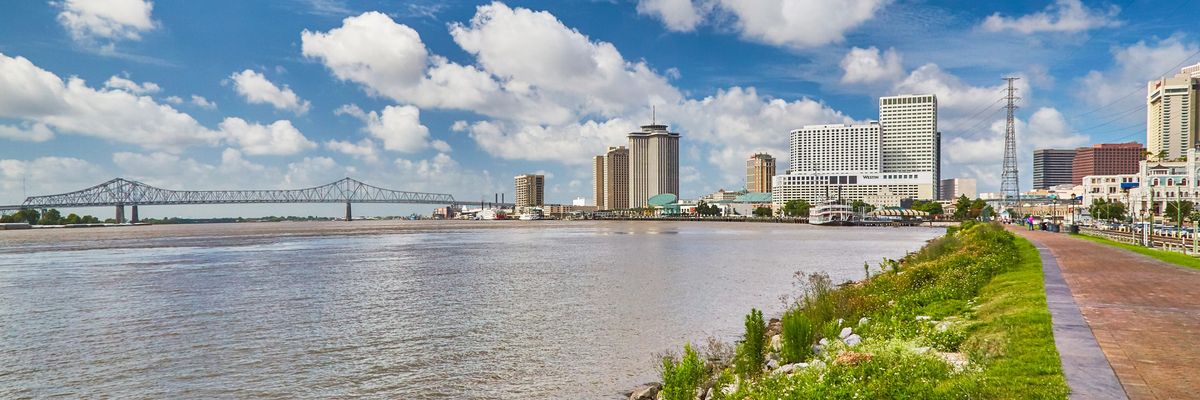Eric Zerkel and Angela Fritz at CNN report on the great saltwater intrusion that is threatening drinking water over the next few months in New Orleans and towns to its south. The Mississippi delta was created by the silt deposited as the great river flowed south into the Gulf of Mexico, pushing away its salt water.
The head of the New Orleans office of the Army Corps of Engineers, Col. Cullen Jones, is quoted by them as saying that in order to push the saltwater away, the flow rate of the Mississippi needs to be higher than 300,000 cubic feeet per second.
The megadrought that has gripped the American Southwest for two decades, and which has been made substantially more likely by human-caused climate change, has had an unfortunate effect on the Mississippi River, denying it the volume of water that would ordinarily flow into it from rains, snow melt, and other bodies of water. The dry spell from 2000- 2019 has been found by scientists to have seen the driest soil conditions since the year 800 CE, when Harun al-Rashid ruled the Abbasid caliphate from the newly founded capital of Baghdad and Charlemagne presided over the Holy Roman Empire from Aachen.
The rate of the water flow in great rivers is being reduced on several continents by extra heat and desiccation.
Scientists estimate that human-caused climate change, provoked by our driving gasoline cars and heating and cooling our buildings by burning coal and fossil gas, has made the drought 19% worse than it would otherwise have been.
Not only has there been less precipitation, it has been hotter, so water evaporates in greater quantities.
As a result, right now the flow rate of the Mississippi has plummeted to only 150,000 cubic feet per second.
So the saltwater of the Gulf is gradually flowing north into the Mississippi. Eventually it will deprive 800,000 people of drinking water and affect four parishes of New Orleans.
It isn’t good to drink salt water. It causes people to excrete more water than they take in, so they die of dehydration and thirst even while they keep trooping to the toilet to urinate.
Drinking water will have to be brought in by barge, an expensive proposition, or ultimately by a water pipeline, which will be even more expensive.
This problem is not going away. In fact, it will get worse.
The EPA explains, “Climate change is affecting the Southwest. Temperatures have increased by almost 2°F in the last century, with the 2001-2010 decade being the warmest since records began 110 years ago. The length of the frost-free season has increased by 19 days in recent decades. Average annual temperatures are projected to rise an additional 3.5°F to 9.5°F by the end of this century, with the greatest temperature increases expected in the summer and fall. Drought conditions are already common in the Southwest and drought periods are expected to become more frequent, intense, and longer. Drought will affect important water sources, including the Colorado River Basin. Combined with expected population growth, climate change will exacerbate existing stresses.”
So here’s the kicker. It isn’t just New Orleans that is menaced by sea water intrusion because of human-caused climate change.
Basra in Iraq is in the same dilemma. The mighty Tigris and Euphrates rivers flow together in southern Iraq into a body of water called the Shatt al-Arab, which then flows out into the Gulf. The Iran-Iraq War in 1980-1988 was fought in part over ownership of the Shatt al-Arab. Because of drought, heat, and damming works to the north in Iran and Turkey, the flow rate of the Shatt al-Arab has been much decreased. The saltwater of the Gulf is therefore intruding north. Since people irrigate off the Shatt, it has harmed agriculture and date orchards.
This problem is also slated to get worse.
Then there is Alexandria, Egypt’s second-largest city, which was founded by Alexander the Great in 331 BCE. It sits at the mouth of the Nile Delta and is also menaced by saltwater intrusion, from the Mediterranean.
When we talk about sea water rise as a result of climate change, we often concentrate on the threat of flooding of coastal areas. It isn’t only that the seas are rising. River deltas suffer from subsidence and so sink over time. And the rate of the water flow in great rivers is being reduced on several continents by extra heat and desiccation. So here is another outcome, the salinization of major sources of fresh water that had made some great coastal cities possible.




